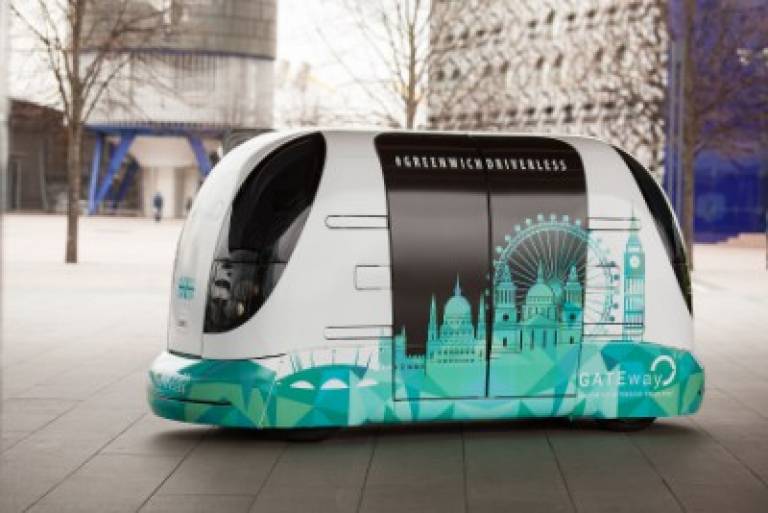The future's bright, the future's driverless..
UCL Transport Institute (UCLTI) commissioned by the Department for Transport (DfT) to conduct scoping study into the social and behavioural questions associated with automated vehicles.

12 September 2017
Early in 2016 UCL Transport Institute (UCLTI) was commissioned by the Department for Transport (DfT) to conduct a scoping study into the social and behavioural questions associated with automated vehicles - better known as AVs.
The contract, negotiated and managed by UCL Consultants (UCLC), required the UCLTI team, led by senior research associate Dr Tom Cohen, to ask some searching questions of the opportunity and potential of AV technology, and, more importantly, our response to it.
But why? Don't most commentators talk positively about the benefits of these innovations?
For example, in the forward to the 2015 Department for Transport (DfT) research report titled 'The Pathway to Driverless Cars', MP and then Parliamentary Under Secretary, Claire Perry wrote, 'Driverless vehicle technology has the potential to be a real game changer on the UK's roads, altering the face of motoring in the most fundamental of ways and delivering major benefits for road safety, social inclusion, emissions and congestion.'
Slow down - potential hazard ahead
However, when UCLTI's final report was published by the DfT in January 2017, Minister of State, John Hayes MP, commented in the forward 'Understanding the attitudes, behaviour and wider public acceptability of transport users will be critical to the success of this technology. So it's vital that transport users, stakeholders and the wider public are at the heart of the design, development and deployment of AVs.'
UCLTI's team of researchers led by Dr Tom Cohen agrees, 'Despite the media attention given to this subject, the technology is still young and the attitudes and possible responses of the wider public to that technology are not clearly understood.'
This lack of understanding was highlighted in a key part of the UCLTI team's study - reviewing the literature available on the subject. It revealed a strong focus on the more technical aspects of the subject while social and behavioural issues were under-researched. Few non-technology topics were studied in any depth and some, such as health impacts, were barely acknowledged.
A big topic
Little wonder the work took Tom and his team consisting of Professor Peter Jones, Dr Nicola Christie, Professor Ben Heydecker, Dr Jack Stilgoe, Dr Peter Antonioni and Dr Clemence Cavoli, took just under a year to complete. He said, 'This was a huge and amorphous subject. Take just one example: our comprehensive review of the relevant literature produced approximately 50,000 references for us to check. We eventually reduced this to 432 sources, and then to a final selection of 62 documents for more detailed analysis.'
He added, 'Over 40 stakeholders participated in the workshops while a further nine participated in expert interviews. Furthermore, our study generated a set of nearly 400 questions relating to automated vehicles.'
The questions of the team broadly fell into four themes - each a large research topic in their own right - and these ranged from the interaction between the user/driver and highly automated/driverless' car to the wider, longer-term social, economic and environmental impacts of such vehicles.
Time to stop and think
Tom concluded, 'Our report contained a dozen possible future 'scenes' that AVs could create - good and bad - which were used to stimulate input during our stakeholder workshops. However, they do make you stop and think about the potential impacts of this technology and the best way of taking it forward, for the benefit of us all.'
And John Hayes MP seems to agree, he concluded in the forward to UCLTI's final report, 'There is much left for the sector to understand now and in the future on the social and behavioural implications of AVs for transport and beyond...the study has made some recommendations for future research not just for Government but for the entire AV sector to engage with.'
 Close
Close


